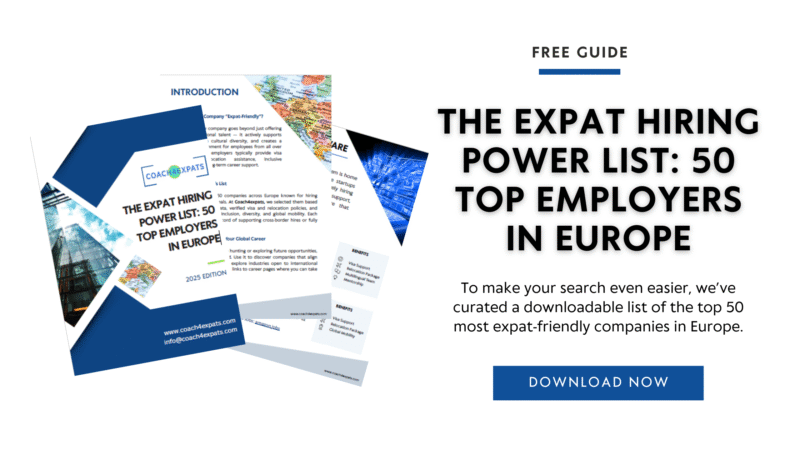Visa & Work Permit types for Non-Tech Expats: How to get a job when you don’t work in IT

You’ve heard the stories that make moving abroad sound like it’s only for tech wizards or corporate executives. But that’s not the whole panorama. The world needs different kinds of skills, people able to showcase compassion, creativity, and dedication, maybe now more than ever. You are part of a global story of connection,and your chapter is just waiting to be written.
Here’s the truth: Europe’s immigration landscape for non-European citizens is a paradox. On one side, political winds have brought stricter border controls and tougher migration rules. On the other, countries are actively searching for people just like you, skilled, dedicated, and ready to fill critical labor shortages. This isn’t a contradiction; it’s an opportunity disguised in complexity.
In this environment, success isn’t about being “just another applicant.” It’s about positioning yourself as a professional whose role a country can’t afford to leave unfilled. That’s how you open the right doors. And the good news? Those doors exist.
Today, there are three powerful ways to step through them:
– Sponsored Employment Visas: where an employer champions your application, even through the bureaucracy.
– Program-Based Student Visas: a clever route that lets you work part-time while studying, bypassing traditional work permit hurdles.
– Job-Seeker Visas like Germany’s Chancenkarte: giving you the freedom to enter, look for work, and secure your future from the inside.
This isn’t just about paperwork or bureaucracy. This is about planting your feet in a place you’ve always dreamed of living. Walking cobblestone streets, tasting new flavors, and building a life that feels fully yours. And you don’t have to navigate it alone. Let’s walk this road together.
The big picture: why non-tech expats matter
Across the continent, there’s an anomaly at play. Yes, governments are getting tougher on irregular migration. But at the same time, they are rolling out the welcome mat for people with skills that keep classrooms full, hotels running, and communities cared for. Shortage lists are expanding. Salary thresholds are lowering. Professions like “school and out-of-school teachers” are now officially classified as highly skilled in Germany, an acknowledgment that your work is essential, not optional.
Here’s the thing: you don’t need to be a coder or an engineer to be in demand. The skill that gets you through the door isn’t just technical, it’s human. Compassion, cultural understanding, specialized training, and professional experience are all currencies in today’s immigration market. When you position yourself as a solution to a country’s shortage, you stop being “another applicant” and start being the answer they’ve been looking for.
Key visa pathways for non-tech roles
Some visas require a willing employer to sponsor you. Others let you step onto new soil first and look for work later. And some are designed for creatives and cultural professionals, because talent isn’t just measured in spreadsheets, it’s measured in impact.
Here are the main routes you can explore:
| PATHWAY | WHO IT’S FOR | HOW IT WORKS | KEY ADVANTAGES | TYPICAL REQUIREMENTS | EXAMPLES OF COUNTRIES |
| Sponsored Employment Visa | Teachers, hospitality managers, specialty chefs, caregivers, skilled trades | An employer offers you a job and handles the visa process on your behalf | Clear route to work & potential residency; employer covers process | Job offer, qualifications, clean record, health insurance; job often on shortage list | UK (Skilled Worker), Germany (EU Blue Card), Ireland (General Employment Permit) |
| Program-Based Student Visa | Language teachers, aspiring hospitality workers, anyone open to study+work | You enroll in a course (language, cultural, or professional) and can work part-time legally | Predictable process; gain local experience; build a network | Proof of enrollment, background check, proof of funds, health insurance | Spain (NALCAP), France (TAPIF), Italy (Language School Visa) |
| Job-Seeker Visa | Professionals with qualifications but no job offer yet | Enter the country for a set time to look for work (e.g., Germany’s Chancenkarte) | Removes employer burden; part-time work allowed | Qualifications, language skills, financial proof, health insurance | Germany (Chancenkarte), Austria (Job Seeker Visa), Sweden (Residence Permit for Job Seekers) |
| Artist & Cultural Professional Visa | Musicians, dancers, writers, filmmakers, designers, cultural educators | Apply as a self-employed cultural worker or through special artist programs/residencies | Recognizes creative work as economic contribution; flexibility in projects | Portfolio, proof of past work, contracts or letters of intent, financial proof | Germany (Freelance Artist Visa), France (Talent Passport – Artist), Netherlands (Residency for Artists) |
| Seasonal or Short-Term Work Visa | Hospitality staff, agricultural workers, festival/event staff | Temporary work during peak seasons, often tied to tourism | Faster processing; legal short-term entry | Job offer, accommodation proof, quota availability | Italy (Decreto Flussi), Greece (Seasonal Work Visa), Portugal (Seasonal Work Permit) |
Each of these doors opens into a different kind of adventure. Some give you structure and security from day one, others give you freedom to explore before you commit, and some let you bring your art, your culture, and your heart’s work to a new audience. The question isn’t if there’s a path for you, it’s which one feels like home.
Common challenges & how to overcome them
Challenge 1: The “Job-Visa” dilemma
Employers often prefer candidates who already have work rights, but you can’t get work rights without a job. This is where strategy comes in. Target large employers or institutions already set up for sponsorship, or choose visa types that remove the employer burden altogether, like job-seeker or student visas.
Challenge 2: The fragmented system
There is no single “European visa.” Every country has its own rules, its own timelines, and its own priorities. A visa that’s easy to get in Spain might be nearly impossible in the Netherlands. The solution? Focus on one country’s system at a time and align your application to its political and economic needs right now, because these lists and rules do change.
Challenge 3: Paperwork Precision
In Europe’s immigration system, a single missing document can mean a flat-out “no.” Proof of qualifications, background checks, health insurance, and financial stability aren’t just formalities, they’re proof you can contribute without becoming a burden. Build a meticulous, country-specific checklist, and check it twice before you submit.
Challenge 4: Employer Hesitation
Some employers hesitate because sponsorship costs time and money. You can overcome this by making their decision easier, show you already meet every visa requirement, highlight shortage-list status, and even offer to connect them with immigration resources or consultants who can handle the process.
Challenge 5: The Language Barrier
For many non-tech expats, the biggest hurdle isn’t the visa, it’s the voice. While English can take you far in international schools, major cities, and tourism hubs, smaller towns and local employers may expect you to work in the local language from day one. This can make the difference between getting a “We’ll be in touch” and “When can you start?”
How to overcome it:
– Start learning before you arrive. Even basic conversation skills show commitment.
– Look for jobs or programs where English is the working language while you keep studying.
– Use your language learning as part of your “value pitch”, it signals adaptability and cultural respect, qualities employers love.









